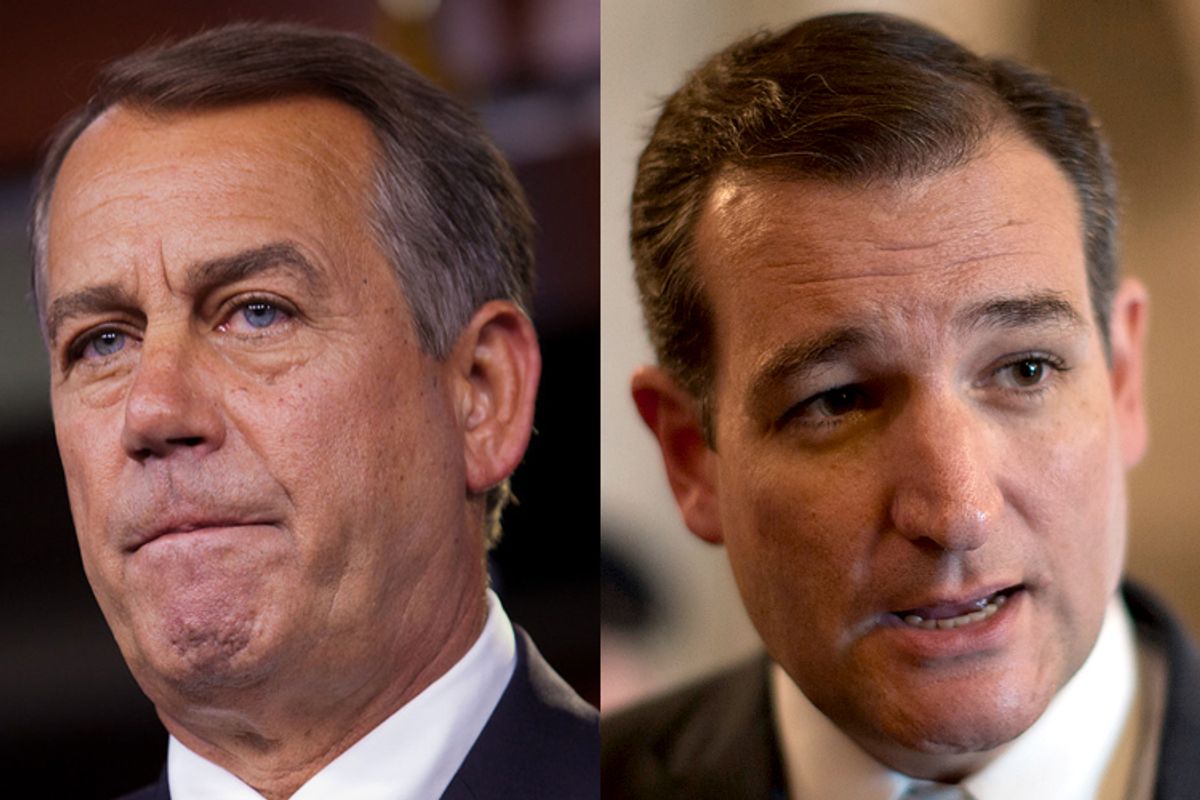Depending whom you ask, House Speaker John Boehner's public divorce this week from the conservative advocacy shops that bullied him into a government shutdown two months ago, and the subsequent House passage of a Bipartisan Budget Act, portends a huge sellout (baaad), or a huge sellout (good!).
The underlying theory is identical, but the question of whether it's a positive or lamentable development depends on your ideological allegiances. By declaring himself free from the consequences of transgressing influential conservative scorekeepers -- "I don't care what they do," Boehner said Thursday -- he has widened the potential scope of legislative politics in 2014. If those guys don't matter -- if he feels free to cross them at this juncture -- it creates coalition-building opportunities that were unthinkable a week or a month ago.
Red State founder Erick Erickson thinks it was a harbinger of Boehner's strategic decision to isolate the right ahead of his coming immigration reform capitulation. He writes:
John Boehner is trying to get the “us vs. them” battle lines drawn before primary season." He needs those lines drawn because he is about to move on to the immigration fight. To get to that fight, he has to take on the conservative movement in a number of primaries around the country…. Boehner needs to draw fence sitters to him, make conservative groups unpopular, and then dare the fence sitters to go sit with the unpopular crowd during the immigration fight. He’s been staffing up for the immigration fight in the House. Today, he fired the first real shots in that battle. He’s done as Speaker. This is all legacy building now. And if he has to cry on television and attack his conservative base, he’ll do it.
In an act of subtle trolling or irrational exuberance (I can't tell which), Greg Sargent of the Washington Post explained why this might herald the collapse of Boehner's right flank, followed by a slow, slow trickle of progress on a variety of bipartisan initiatives.
If there aren’t serious repercussions within his caucus, won’t that suggest that the party’s right flank has been very badly weakened in ways that should have real ramifications going forward? After all, if Boehner is really serious about stiff-arming these groups, arguing that their destructive and failed tactics have proven them to have no credibility, we won’t be seeing another debt ceiling hostage crisis later this year, right? And why stop there? Now that Boehner is a free man, let’s move on to extending unemployment insurance, reforming immigration and ending anti-gay workplace discrimination!
I don't want to suggest that Boehner's eruption at these hard-line groups was a non-event. It was clearly a big departure for him, at least temperamentally. But Boehner's not a Democrat and he's not a liberal. It remains true that the biggest differences on the right are strategic, not substantive. And I think the poisonous environment in the conservative movement -- and specifically the bad blood between GOP leaders and groups like Heritage Action -- has obscured the fact that in many instances the two factions' incentives still align.
Ever since he became speaker, Boehner has been reluctant to forge coalitions with Democrats, particularly when Democrats end up controlling the policy and supplying the overwhelming majority of votes. As a rule he's only done this when sticking with the right would send the country past some deadline or over some cliff, and even then he's acted reluctantly. The expiration of the Bush tax cuts, emergency Sandy aid, the Violence Against Women Act, the debt limit. The one time he strayed from his strategic North Star, he allowed the government to shut down and it was a huge disaster for him and his party.
But he's never strayed in the opposite direction. There's no immigration reform cliff. There's no Employment Non-Discrimination Act cliff. There's no paycheck fairness cliff. There's no Voting Rights Act cliff. And there's almost no prospect of GOP action on any of these issues. If Boehner ignores them he won't trigger any new disruptions -- people's lives will just continue to be more difficult than they necessarily have to be.
Boehner's always done what the professional right wants except when the right's strategic and self-serving objectives would prove substantively and politically calamitous.
How has that changed now that he's demonstrated enough moxie to upbraid them? I'm not sure it's changed much at all. Let's not lose sight of the fact that Boehner's cri de couer came hours ahead of a floor vote on a budget bill, and he needed a significant Republican showing to send those groups a clear message: no more government shutdowns.
Taking a broader view, maybe he'll use his newfound freedom to increase the debt limit (deadline: two months) without staging another economically damaging dog and pony show. But the debt limit's going up either way. Maybe advocacy groups won't be able to browbeat him out of holding demonstration votes on immigration proposals. But what does that matter if Boehner doesn't support comprehensive reform, or thinks it will augur the end of his speakership?
When has John Boehner, DOMA defender, ever voluntarily struck a blow for LGBT equality? Or for stimulus spending on poor people. Boehner has policy objectives and political imperatives of his own, and they're not so different from those on the professional right, even if as speaker he can't be quite as boorish as they are about pursuing them.
I yearn to be proven wrong. But if anything, I think his willingness to go all Bulworth on the right this week will mainly help clarify that in most instances Boehner's not some RINO who only ever does conservatives' bidding because he's afraid of incurring their wrath.



Shares